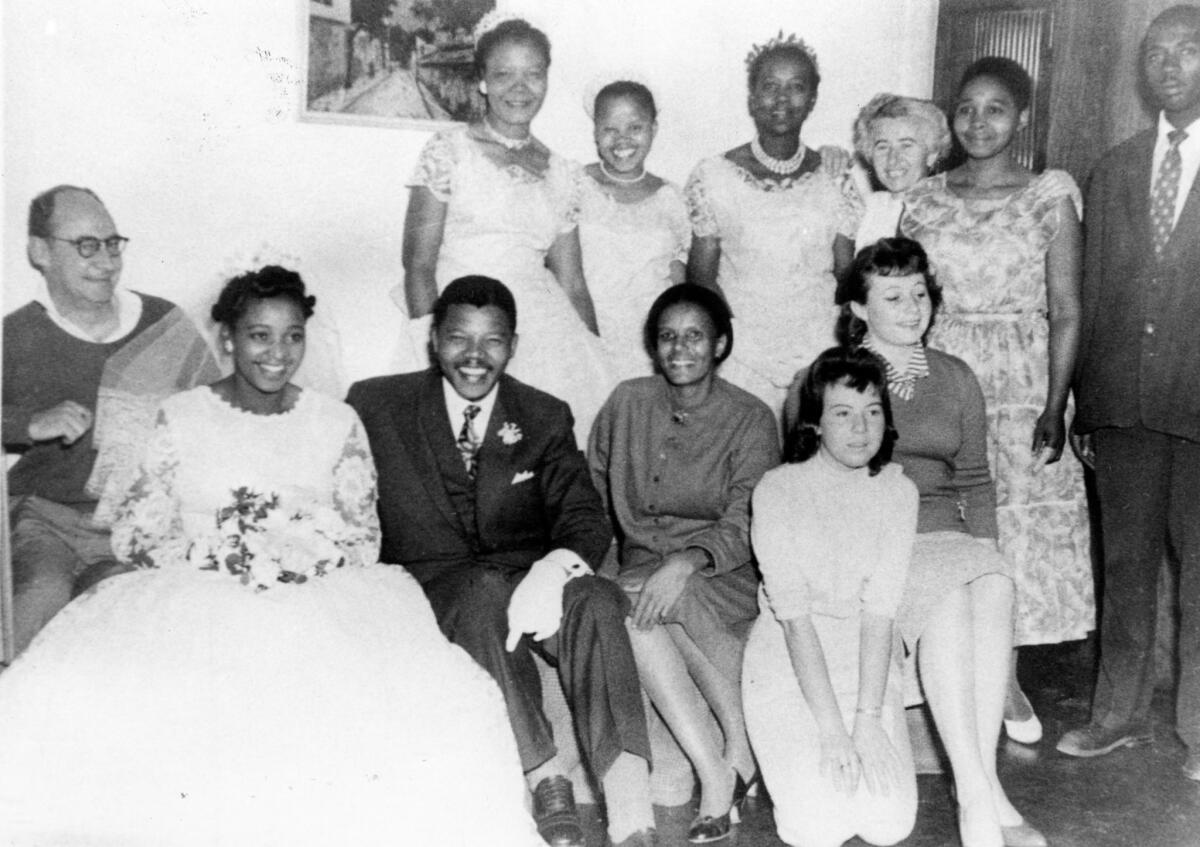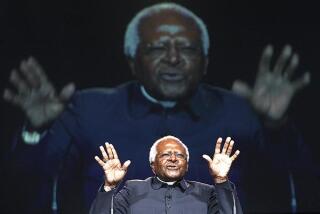Tragedy dogged the triumphant Nelson Mandela

- Share via
JOHANNESBURG, South Africa — The moment would haunt Nelson Mandela all his life. It was 1948, and he was in a hospital watching his baby daughter struggle for life.
The child, Makaziwe, or Maki, died as he watched. She was 9 months old.
Mandela’s life was Kennedyesque in its combination of great political achievement and heartbreaking personal tragedy.
Mandela would also lose both his sons — in a car accident and to AIDS. And in 2010, on a day of great national pride, he missed the soccer World Cup opening after his great-granddaughter, 13-year-old schoolgirl Zenani, was killed in a car accident on the way home from the kickoff concert the previous night.
PHOTOS: Nelson Mandela through the years
In South Africa’s brutal Robben Island prison, it wasn’t the bad food, the uncomfortable cell or the hard labor that tormented him. It was his separation from his family, particularly his mother and his second wife, Winnie, and their two daughters, Zeni and Zindzi.
In prison he felt the guilt of a workaholic, absent husband and father who had traveled often, neglecting those closest to him for the sake of the struggle against apartheid. He spent the rest of his life trying to make up for it, according to biographer Charlene Smith.
Mandela’s agony is revealed in a series of letters written from prison to Winnie and to friends, published in Mandela’s final book, “Conversations with Myself.”
He wrote to Irene Buthelezi, wife of then-ANC activist Mangosuthu Buthelezi, in 1969, opening his heart about the deaths of his baby daughter and a son.
Maki was in a hospital, apparently recovering from illness, when her condition suddenly deteriorated.
FULL COVERAGE: Anti-apartheid icon Nelson Mandela dies
“I managed to see her during the critical moments when she was struggling desperately to hold within her tender body the last sparks of life, which were flickering away. I have never known whether or not I was fortunate to witness that grievous scene,” Mandela wrote.
But nothing prepared him for the death of “the pride of my heart,” his older son, Thembi, in the same year as the letter. (Thembi, like Maki, was from his first marriage.)
Mandela compared his grief to that suffered by a tribal chief savaged by a lion, whose wounds had to be cauterized with a red hot spear.
He remembered coming home from an overseas trip studying African liberation movements and revolutionaries in 1962 to meet Thembi, then 17, proudly wearing a slightly-too-big pair of Mandela’s own trousers. He was deeply touched. He knew his son was a snappy dresser and had no need at all for his trousers.
The last time Mandela saw Thembi — anxious and afraid that his father would get the death penalty — was at his trial for sabotage five years before the young man was killed in a car crash.
PHOTOS: The world reacts to Nelson Mandela’s death
“The news was broken to me about 2.30 p.m. Suddenly my heart seemed to have stopped beating and the warm blood that had freely flown in my veins for the last 51 years froze to ice,” he wrote. “For some time, I could neither think nor talk and my strength appeared to be draining out. Eventually I found my way back to my cell with a heavy load on my shoulders and the last place where a man stricken with sorrow should be.”
His request to attend the funeral was denied. It was the second time in a year he’d been denied such a request. Authorities hadn’t let him attend his mother’s funeral, another death that hit him hard.
“I had never dreamt that I would not be able to bury Ma,” he wrote in a 1969 letter.
When he was in prison, Winnie was harassed and imprisoned. She spent time in solitary confinement and under house arrest. She sent their two daughters to stay with friends in Swaziland.
“I feel as though I have been soaked in gall, every part of me, my flesh, bloodstream, bone and soul, so bitter I am to be completely powerless to help you in the rough and fierce ordeals that you are going through,” he wrote her in 1970. He missed her terribly, and used to note down in his diary the outfit she was wearing whenever she visited, and her appearance.
In a 1976 letter to her, he mourned “my sleeping without you next to me and my waking up without you close to me, the passing of the day without my having seen you.”
He wrote to his daughters, then 8 and 10, in June 1969 to try to console them when their mother had been taken away to prison too:
“Once again our beloved Mummy has been arrested and now she and Daddy are away in jail. It may be many months or even years before you will see her again. For long, you may live like orphans, without your home and parents, without the natural love, affection and protection that Mummy used to give you.... Perhaps never again will Mummy and Daddy join you in house number 8115 Orlando West, the one place in the whole world that is so dear to our hearts.”
After his release from prison in 1990, he had to endure Winnie’s infidelity. In March 1996, the president took the stand in a packed Johannesburg courtroom to publicly accuse “the defendant” of adultery with an ANC aide. Mandela said that after his release from prison, his wife had never entered their bedroom while he was awake.
Mandela married two years later. And he found happiness in his marriage with Graca Machel, widow of the former president of Mozambique, saying, “I don’t regret the … setbacks I’ve had because, late in my life, I am blooming like a flower.”
But more sorrow was to come. His surviving son, Makgatho, died of AIDS in 2005. Mandela was the first African leader to acknowledge losing a family member to the illness, which still carries a stigma here.
Critics of the Mandela clan have sometimes attacked an extravagance and arrogance of some members of the extended family who seem out of step with the patriarch’s ideals and humility.
Even Mandela himself wasn’t averse to bling: He reportedly gave his daughter Zindzi a silver Mercedes for her recent 50th birthday.
Critics raised concern that the party, where champagne flowed and guests got extravagant take-home gifts, was sponsored by an individual or company, not paid for by the family. Mandela himself didn’t attend because of deteriorating health.
Zindzi’s mother, Winnie, present at the party, had recently been embroiled in yet another scandal when her car was stopped for speeding recklessly, just six months after the death of her great-granddaughter in a speeding car.
Smith, Mandela’s authorized biographer, said Mandela was human and that his Achilles’ heel was his family.
“Mandela is a man. A very great man, but his weak point was his family,” she wrote in a 2011 column on Mandela.
“He felt eternally responsible for the suffering of his children and Winnie while he was in prison and he never stopped trying to heal their pain.”
ALSO:
South Africa struggles to live up to Nelson Mandela’s legacy
Nelson Mandela dies: Watch his 1st TV interview, prison release, more
Memories of Mandela and the country he loved from a Times correspondent
Twitter: @latimesdixon
More to Read
Sign up for Essential California
The most important California stories and recommendations in your inbox every morning.
You may occasionally receive promotional content from the Los Angeles Times.










